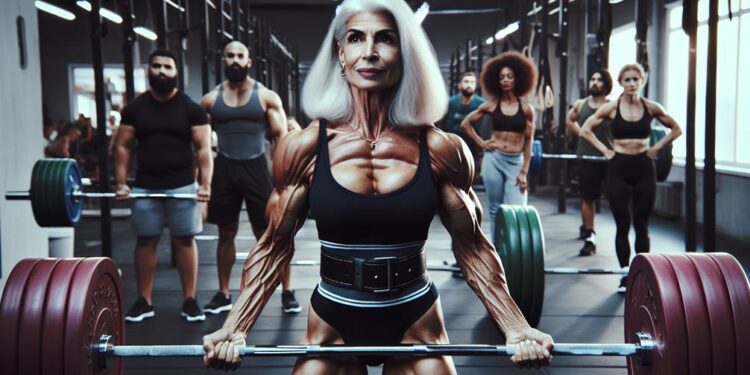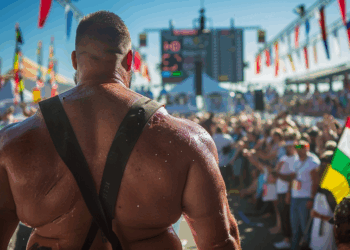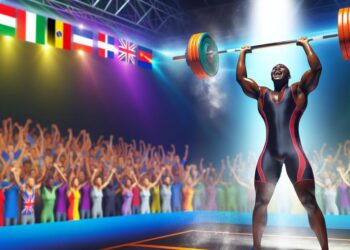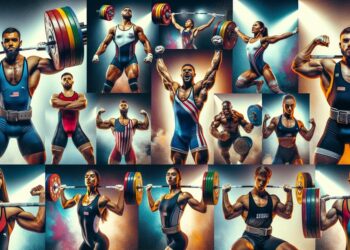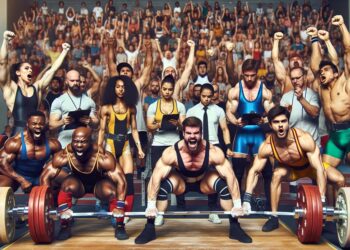As you step into the weight room, the iron plates stacked high and the sound of clanging barbells filling the air, you can't help but wonder – does age really impact your powerlifting journey? Well, my fellow lifter, prepare to have your questions answered. In this discussion, we will delve into the fascinating world of powerlifting and explore the unique challenges and considerations that come with age. From the changes in muscle mass and strength to the importance of joint health and flexibility, we will uncover valuable tips and strategies that will help you optimize your performance and continue to thrive in the world of powerlifting, no matter your age. So, tighten your lifting belt and get ready to unlock the secrets to successful powerlifting at any stage of life.
Key Takeaways
- Resistance training can help counteract age-related muscle loss and strength decline by improving hormonal balance and increasing muscle mass.
- Regular stretching and joint-specific exercises can improve joint mobility, stability, and range of motion, reducing the risk of injuries.
- Proper nutrition, active recovery activities, quality sleep, and gradually increasing training intensity while allowing for rest days are important for recovery and injury prevention.
- Modifying training intensity and volume, prioritizing compound exercises, and adjusting nutrition and supplementation can optimize performance and reduce injury risk for older powerlifters.
Age-Related Changes in Muscle Mass and Strength
As you age, it is common for both muscle mass and strength to decrease, but there are ways to counteract these age-related changes. Hormonal influences play a significant role in muscle aging. Testosterone, for example, decreases with age, leading to a decline in muscle mass and strength. However, research suggests that resistance training can help improve hormonal balance and increase muscle mass even in older adults. By engaging in regular strength training exercises, you can stimulate the production of growth hormone and testosterone, which can help combat the age-related decline in muscle mass.
In addition to hormonal influences, psychological factors can also affect performance in older lifters. As we age, we may face challenges such as decreased motivation, fear of injury, or self-doubt. However, it is important to remember that age is not a barrier to strength and fitness. Setting realistic goals, seeking support from like-minded individuals, and focusing on the positive aspects of your progress can help overcome these psychological barriers. Remember, weightlifting is not just about physical strength; it is also about mental resilience and determination.
Joint Health and Flexibility Considerations
Maintaining joint health and flexibility is crucial for older lifters to prevent injuries and maximize their performance. As we age, our joints naturally undergo changes that can affect their mobility and increase the risk of injuries. However, there are several strategies that can help older lifters maintain their joint health and flexibility:
- Regular stretching: Incorporate a dynamic warm-up routine before each training session to increase blood flow to your muscles and improve joint mobility. Static stretching after your workout can also help to maintain flexibility.
- Joint-specific exercises: Include exercises that target the specific joints you use during powerlifting, such as shoulder dislocations and ankle circles. These exercises can help to improve joint stability and range of motion.
- Proper form and technique: Pay close attention to your lifting technique to avoid placing excessive stress on your joints. Work with a qualified coach or trainer to ensure that you are using proper form and technique.
- Adequate rest and recovery: Giving your joints enough time to recover between training sessions is crucial for maintaining joint health. Listen to your body and take rest days when needed.
Recovery and Injury Prevention Strategies for Older Lifters
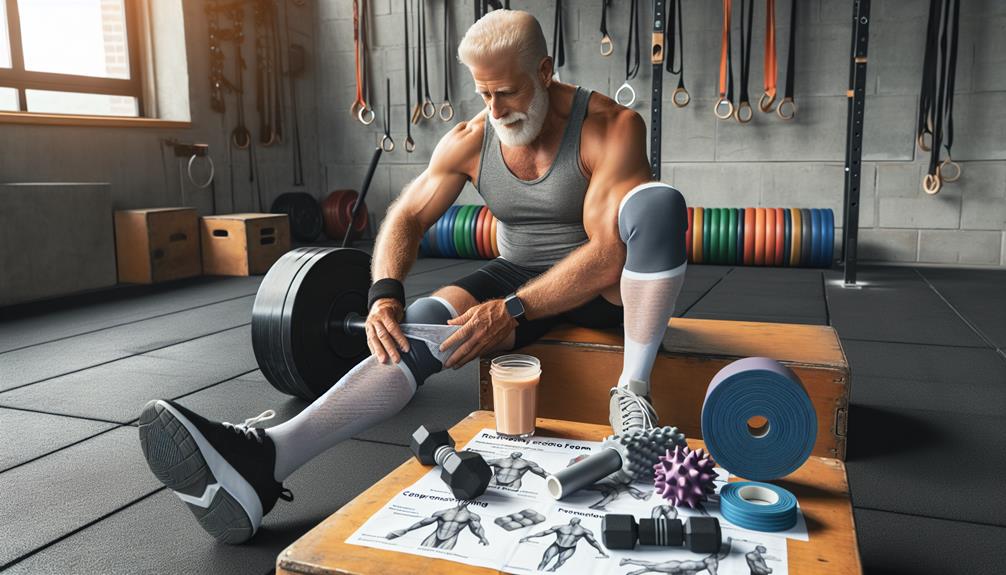
To ensure optimal performance and minimize the risk of injuries, older lifters should prioritize recovery and implement effective strategies for injury prevention. As we age, our bodies require more time to recover from intense workouts, making it crucial to incorporate specific techniques to aid in muscle recovery and prevent injuries. Here are some evidence-based strategies for older lifters to consider:
- Proper Nutrition: Consuming a balanced diet rich in protein, healthy fats, and carbohydrates is essential for muscle repair and recovery. Adequate hydration is also crucial to maintain optimal performance.
- Active Recovery: Engaging in low-impact activities such as swimming, yoga, or light cardio can help promote blood flow, decrease muscle soreness, and improve flexibility.
- Quality Sleep: Getting enough quality sleep is vital for muscle recovery and overall health. Aim for 7-9 hours of uninterrupted sleep per night.
- Progressive Training: Gradually increasing training intensity and volume, while allowing for sufficient rest days, can help prevent overuse injuries and promote muscle adaptation.
Modifying Training Intensity and Volume for Optimal Performance
Modifying training intensity and volume is crucial for older lifters to optimize their performance and minimize the risk of injuries. As you age, your body undergoes physiological changes that can affect your ability to recover and adapt to training stress. By adjusting the frequency and volume of your workouts, as well as selecting appropriate exercises, you can continue to make progress while reducing the risk of overtraining or overuse injuries.
Here are some practical tips to help you modify your training for optimal performance as an older lifter:
- Decrease training frequency: As you get older, it may take longer for your body to recover from intense workouts. Consider reducing the number of training sessions per week to allow for adequate recovery and prevent overtraining.
- Adjust training volume: Instead of long, high-volume workouts, try breaking them up into shorter, more manageable sessions. This can help you maintain intensity while reducing the overall volume and stress on your body.
- Prioritize compound exercises: Focus on exercises that target multiple muscle groups, such as squats, deadlifts, and bench presses. These compound movements not only maximize muscle recruitment but also enhance functional strength and stability.
- Incorporate rest days: Rest days are just as important as training days, especially for older lifters. Allow your body time to recover and repair by scheduling regular rest days in your training program.
Nutrition and Supplementation Tips for Older Powerlifters

For optimal performance, older powerlifters can benefit from implementing nutrition and supplementation strategies tailored to their specific needs. Nutrition plays a crucial role in supporting muscle growth, recovery, and overall health. To maximize your performance as an older lifter, focus on consuming a well-balanced diet that includes adequate protein, carbohydrates, and healthy fats.
Start by ensuring you're getting enough protein, as it is essential for muscle repair and growth. Aim for 1.2-1.6 grams of protein per kilogram of body weight per day. Good sources of protein include lean meats, poultry, fish, eggs, dairy products, legumes, and tofu.
Carbohydrates are also important for providing energy during workouts. Opt for complex carbohydrates such as whole grains, fruits, and vegetables, which provide sustained energy and essential nutrients. Be mindful of your overall calorie intake to maintain a healthy weight and fuel your workouts effectively.
In addition to a balanced diet, certain supplements can support your training and recovery. Creatine monohydrate has been shown to improve strength and power in older adults. Beta-alanine may enhance muscular endurance, while fish oil can reduce inflammation and support joint health.
While supplements can be beneficial, it's important to remember that they should not replace a proper diet. Consult with a healthcare professional or a registered dietitian to determine the right supplements for your individual needs.
Frequently Asked Questions
How Does Age Affect Powerlifting Performance?
As you age, the effects of aging on powerlifting performance become evident. It's important for older lifters to modify their training to accommodate these changes and prioritize injury prevention and recovery.
Are There Any Specific Exercises or Training Techniques That Older Lifters Should Avoid?
There are certain exercises and training techniques that older lifters should avoid to prevent injury and maximize their performance. Take care to avoid exercises that put excessive strain on joints and opt for safer alternatives.
What Are Some Common Injuries That Older Lifters May Experience in Powerlifting?
Common injuries that older lifters may experience in powerlifting include strained muscles, joint pain, and back injuries. To prevent these, focus on proper form, warm up properly, and listen to your body's limits.
Can Older Lifters Still Compete at a High Level in Powerlifting?
Of course you can still compete at a high level in powerlifting as you age! While it may require more attention to nutritional needs and specific strategies for maintaining strength and muscle mass, it's absolutely possible.
Is It Necessary for Older Lifters to Take Any Additional Supplements or Medications to Support Their Training?
You might wonder if older lifters need extra supplements or medications for training. While it's not necessary for everyone, some older lifters may benefit from certain supplements to support their training and medications for any underlying health conditions.
Conclusion
In conclusion, as an older lifter, don't let age hold you back from powerlifting. Embrace the wisdom and experience that comes with age, and use it to your advantage. Just like a phoenix rising from the ashes, you have the power to defy expectations and achieve greatness in the gym. With proper training modifications, joint care, and nutrition, you can continue to push your limits and reach new heights in powerlifting. So spread your wings and soar, because age is just a number.


